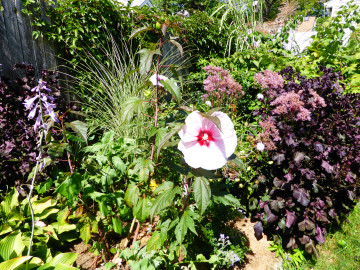Leonard Moorehead, the Urban Gardener: From Acorns Mighty Oaks Grow
Saturday, January 09, 2016
There is a season for all things. Our days gain a few minutes of welcome sunshine each day. Darkness slowly retreats although winter’s grasp is tight. Weekends or lunch allow excursions outdoors and for some of us, the garden prospects are bleak. Gardeners are hopeful folk, snug indoors we keep up with potted plants, we water, give each pot a quarter turn with each soak and pinch back leggy stems. Some of us nurse poinsettias or save an avocado seed, toothpicks stuck into 4 sides suspending them over a jar full of water, bottom side wet. Each hopeful gesture expresses our innate desire for green living plants in the home. Our need to nurture and care for another is condensed.
Yet within there are garden dreams. If you’re like so many others there is one kind of welcome junk mail piled on the kitchen table. Somehow seed catalogs have survived in print media and surviving colorful blooms, robust vegetables and perhaps the latest variety of coneflower cover the table. Pour a cup of coffee or brew chamomile tea. Relax, sip, nibble, pull a couple sheets of paper from the printer and sharpen pencils. Let’s browse our way into the future and consider our next garden. Snow, cold and potholes reign outdoors. Spread across our kitchen table is the ideal future. Its seed catalog season! Step out of your mukluks, shrug off thick coats, and pick up your passports into the next garden.
I confess to a weakness for images of children next to gigantic hibiscus blooms. On the next page fanatics attempt modesty next to half ton pumpkins, and fruit lovers swoon over five types of apples grafted onto one dwarf tree, each grafted apple, peach, or pear borrow Crayola crayon colors without hesitation. Too good to be true? Not in the ideal garden. The garden begins within. Whether you enjoy state fair prize winners, parse corn varieties or delight in dense text the prompts are there to enjoy. I keep a marker handy and circle best impressions or somewhere in the clutter called the home office there are loose leaf 3 ring notebooks packed thick with cut out images, comments and question marks. Thrifty by nature, we compare prices, the virtues of 2 or 3 year rose bushes and saplings, what fun. Let the blizzards knock out power, our prayers for snow days and maybe our late excuses for delayed commuter rails are accepted. Light a candle, hide a snow shovel near the door, and love not hate those that somehow make it to work despite all. That kid next to the hibiscus? Probably sitting at the kitchen table.
GET THE LATEST BREAKING NEWS HERE -- SIGN UP FOR GOLOCAL FREE DAILY EBLASTI learned to read at the kitchen table. Together, we pulled catalogs from the heap of bills. What is arugula? Do zinnias grow around here? Beginning with small fingers a little bigger each year we searched for Big Boy tomatoes and watermelons the size of Kansas. Gardens are for young and old. Within the garden realm is the alpha and the omega. Everything important is discussed at the kitchen table, more coffee for adults, children allowed creamy sweet tea, an extra teaspoon of sugar ok. We dig in and sometimes never get past ranks of stunning iris. “Doesn’t Nana have these near her front steps? Hers are pale purple or butter yellow, where do those flat top white iris grow?” Smiles are abundant, hot from the oven cookies cool before green eyes, we turn a page to red, red beets. Harvard beets have stained many a larger serving of mashed potatoes, often the last to eat and clear the plate. Our beagle Kelly lives expectant under the kitchen table and distains beets. “But Kelly won’t eat beets why should I?” The impeccable logic of dogs is supreme.
Great debates form around the catalogs on the table. Some root for vegetables, others for flowers, tradition calls for perennial mints and beebalm. Luck is found among clovers, adults exchange a glance. Only children can kneel on grassy lawns and pore over the white and pink bloomed clover for the rare four leaved clover. “Why does beet have 2 e’s?” “Because e is a vowel, alone it is short, repeated, it’s long, look at the letters and sound them out” “But eat is long and has an a after it”. Shorter words are easier to remember, “Isn’t bet a word?” “Yes, but much different”, a tone settles that one, grandpa Niven bets on horses, one of his bad habits. “I had to eat oatmeal because of bets.” Oatmeal is good with maple syrup and sliced apples. Remember Dr. Johnson’s Dictionary, “Oats are grain for horses in England, food for the Scots”. Unconvinced, beets appear better on catalog pages than on plates.
Another page and onto carrots. “Why are there two r’s in carrot; it’s not a long word.” Tact calls for distraction, “look, one is called Nantes, that’s in France” a town beyond walking distance probably, interest wanes. Kelly isn’t fond of carrots from France either. A chuckle begins and grows into laughter from Grandpa Niven. “Horses love carrots, grow some and I’ll take you to the track and we can treat them.” Nana collects teabags squeezed dry between spoons. She reserves teabags for the garden. “No one shorter than Grandpa can go to the racetrack.” The cookies have cooled enough to eat.
Luck, hope, long and short words, young and old gather around the kitchen table. Together we pore over the seed catalogs. Everything important is discussed at the kitchen table. Sleet, ice, snow cover the garden. Yet it is within the seeds that we learn and grow. You too can grow hibiscus, plant in a sunny place in good loam, mulch. Remember where it grows, hibiscus sprouts late in spring, long after daffodils. Their huge blooms are the size of children’s heads and much like childhood, last for a day, year after year. Pink, red, white varieties charm, hummingbirds hover over the red first. You can place a sure bet, seed catalogs are coming in the mail and all is good.
Leonard Moorehead is a life- long gardener. He practices organic-bio/dynamic gardening techniques in a side lot surrounded by city neighborhoods in Providence, RI. His adventures in composting, wood chips, manure, seaweed, hay and enormous amounts of leaves are minor distractions to the joy of cultivating the soil with flowers, herbs, vegetables, berries, and dwarf fruit tree.
Related Articles
- Leonard Moorehead, The Urban Gardener: A World in a Drop of Water
- Leonard Moorehead, The Urban Gardener: Harvesting Green Beans + Sunflowers
- Leonard Moorehead, the Urban Gardener: Some Like it Hot
- Leonard Moorehead, The Urban Gardener: Celebrate the Fall Equinox
- Leonard Moorehead, The Urban Gardener: The Fragrant Garden - Herbs for All
- Leonard Moorehead, the Urban Gardener: Peaches and Cream
- Leonard Moorehead, the Urban Gardener: Tomatoes Supreme
- Leonard Moorehead, The Urban Gardener: Respect and Reverence
- Leonard Moorehead, the Urban Gardener: Apricots Rule the Dog Days
- Leonard Moorehead, the Urban Gardener: Summer Garden Vacations
- Leonard Moorehead, The Urban Gardener: Basil, King of Herbs
- Leonard Moorehead, The Urban Gardener: Infinity Beckons
- Leonard Moorehead, the Urban Gardener: Glorious Asters Star
- Leonard Moorehead the Urban Gardener: “Scent, First and Last”
- Leonard Moorehead, the Urban Gardener: Garden Size Love Handles
- Leonard Moorehead, the Urban Gardener: Holly Saves Us
- Leonard Moorehead, the Urban Gardener: Winter Solstice
- Leonard Moorehead, the Urban Gardener: Hallelujah, the Leek
- Leonard Moorehead, the Urban Gardener: Garden Gratitude
- Leonard Moorehead, the Urban Gardener: Stormy Horizons
- Leonard Moorehead, the Urban Gardener: Mums the Word
- Leonard Moorehead, the Urban Gardener: Bless the Resolute
- Leonard Moorehead, The Urban Gardener: Frost Bites
- Leonard Moorehead,The Urban Gardener: Minor Bulbs Rule
- Leonard Moorehead, the Urban Gardener: Leaf Harvests




